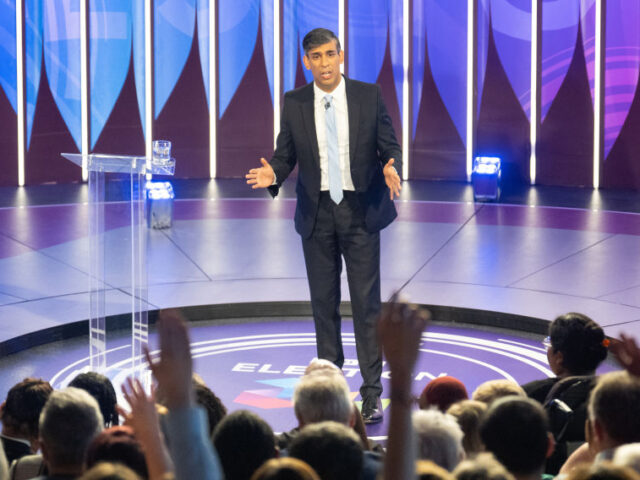British Prime Minister Rishi Sunak proposes a social credit score-lite for the United Kingdom, where access to modern life basics like a car or financial services could be withdrawn for young people who refuse National Service.
Party leaders from top polling electoral factions — except for Reform UK leader Nigel Farage, who was to his disgust excluded — were challenged on national television on Thursday night by state broadcaster the BBC, answering audience questions. Prime Minister Rishi Sunak, who faces apocalyptic polling for his chances to return to the job but who nevertheless hasn’t conceded defeat yet was called on to defend his first election-time policy of promising to introduce national service for young people if re-elected.
While Sunak cited a volunteer ambulance organisation as an example of the sort of mandatory volunteering that could be possible, in reality much of the public concern and discussion has been over the military element of National Service given how widely agreed it is Europe is entering a period of instability and war, and the fact it is to be mandatory.
The Prime Minister was reluctant to engage on how precisely the government would force young people to sign up for National Service and appeared to stumble at one juncture, blurting out a “sorry?” when asked directly about compulsion. While falling short of committing to any one path, and hand-waving away responsibility for doing so by saying an independent body would make these decisions, Sunak said the government was considering restricting access to modern life essentials.
He said: “You will have a set of sanctions and incentives and we will look at the models that are existing in Europe to get the appropriate mix of those, there is a range of different options that exist… whether that’s looking at driving licenses, access to finance…”.
Challenged on whether this would mean young people being denied a bank card for refusing mandatory national service, however, Sunak laughed and said “no, no”. Sunak also appeared frustrated at public focus on the military service, rather than voluntary service side of his proposal, insisting: “”it’s really important for people to know the military option is optional. Alright? No one is going to be forced to do it, it’s actually going to be selective and competitive. National Service will be compulsory, the military option will be something people would choose to do.”
The United Kingdom ended its post-Second World War National Service conscription programme in 1960, taking a radically different approach to national security than other European NATO states during the Cold War, and even disbanding the Civil Defence Establishment. Speaking at the start of the election campaign, Sunak had pitched mandatory service either in the military or civilian volunteering would be a counter to “forces trying to divide our society in this uncertain world”.
Service would “create a shared sense of purpose among our young people and a renewed sense of pride in our country”, he said”. These comments followed a flurry of discussions by top military figures about the growing threat from Russia and of the possibility of war in Europe. As reported, Chief of the General Staff General Sir Patrick Sanders said this year the British Army needs to be retooled to “rapidly expand” to create a “citizen army”.
Eyeing up the incrteasing group of European states bringing back or beefing up military conscription, General Sanders said the present Army Reserve is not enough and looking at the Ukraine war: “We will not be immune and as the pre-war generation we must similarly prepare – and that is a whole-of-nation undertaking”.
Responding to his remarks, a spokesman for the government said, just months before Sunak announced his policy, that: “there is absolutely no suggestion of a return to conscription”.
The suggestion that refusing to comply with the government’s attempt to foster social cohesion through compulsory youth service, and restriction of access to car for a freedom of movement or unspecified financial services for refusal has inevitably triggered comparisons to China’s Social Credit System. Through the system, individuals are scored for loyalty and lose points for behaviour that dissents from Chinese Communist Party orthodoxy. As previously reported, even celebrating Christmas too enthusiastically would lead to points being deducted.
Breitbart News notes of the system: “The consequences of a low social credit score are severe. In 2019, the government boasted that it had blacklisted 13 million people, barring them from public transportation and depriving them of select social services.” Brexit leader Nigel Farage has previously called out the creeping establishment of a Social Credit-like system in British finance, which has started punishing divergent views with withdrawal of services.
He told Breitbart News in 2023: “The argument I’ve been making is if they can do it to me, they can certainly do it to you. What we do know is the British clearing banks are now working with some of the credit agencies to put in place word checks on the social media accounts of their customers. You can see the direction… we are litreally on the verge of this happening. So we really have to start shouting.”

COMMENTS
Please let us know if you're having issues with commenting.